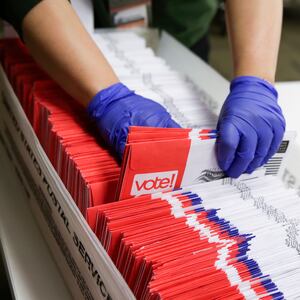Kris Kobach needs Donald Trump—but his loyalty has limits.
As the president has continued to escalate his attacks on mail-in voting during the coronavirus pandemic, Kobach, the former Kansas Secretary of State and early ally of the president, has appeared on television and even written a column supporting Trump’s broad targeting of the practice as others try to make the measure more widespread during the health crisis.
But in his home state of Kansas, where voting by mail will play a key role in deciding the contentious Republican Senate primary that Kobach currently finds himself in, the GOP lightning rod has avoided leveling similar attacks. Mostly because Kobach’s career is tightly intertwined with the state’s process.
ADVERTISEMENT
“The mail-in systems of most states are vulnerable to fraud,” Kobach said in a statement to The Daily Beast. “But when I was Secretary of State, I made Kansas's voting system the safest in the country with specific attention given to mail-in ballots.”
That approach from Kobach, coming two years after he narrowly won a GOP primary contest for governor only to be soundly beaten by a Democrat in the general, reminded one of his critics in the state of the same tenor Trump is taking nationally.
“I think he's doing the same thing Donald Trump is doing when Donald Trump tries to differentiate mail-in voting versus absentee voting, which are the exact same thing,” Democratic State Rep. Brett Parker said. “It’s a backdoor way of saying, ‘It’s ok if you do it if you’re voting for me,’ but still sort of reserving the right to cry foul if you don’t like the election outcome.”
Kobach is now trying to revive his political career by winning a U.S. Senate seat in Kansas. But his latest run has faced attacks from fellow Republicans, who are hoping that Congressman Roger Marshall (R-KS) will beat Kobach in Tuesday’s primary election. Awaiting the GOP nominee in the general election is likely to be Barbara Bollier, a state senator and former Republican who has shown strong fundraising as her party looks to take back control of the Senate.
Trump’s condemnation of mail-in voting has covered a wide spectrum in the last few months. In April, amid Wisconsin’s pandemic primary, Trump leveled the charge that he thought “mail-in voting is horrible. It's corrupt.” The key irony at the time, which was called out by a reporter in the room, was that according to The Palm Beach Post, Trump asked for a mail-in ballot for the March Florida primary.
Since then, he’s threatened federal funding to Michigan over the state sending out absentee ballot applications and tweeted in June that “Because of MAIL-IN BALLOTS, 2020 will be the most RIGGED Election in our nations history—unless this stupidity is ended.” Last week, he went as far as to tie “Universal Mail-In Voting” as a reason to consider delaying the election, a move he cannot legally make on his own.
As recently as Monday, Trump continued to vent frustrations about mail-in voting. After taking a question from the Trump-friendly One America News Network during a press conference, he said, “Universal mail-in ballots is going to be a great embarrassment to our country,” after pointing a New York congressional primary race from June that still doesn't have a clear winner. Trump also claimed he had a right to make some sort of executive order on mail-in voting, but added, “We haven’t gotten there yet, but we’ll see what happens.”
In an April Breitbart column, Kobach wrote that “President Trump was absolutely right to highlight the dangers of mail-in voting,” but pointed to what he had done in Kansas as the exception to his criticism. Kobach reiterated his stance on Lou Dobbs Tonight, saying that “mandatory mail-in voting” if it came to pass nationwide “would just be horrific.”
In a statement to The Daily Beast, Kobach pointed to a series of measures that include a photo ID photocopy or license number requirement on mail ballot requests and a signature verification standard to show that “the Kansas system is the safest in the country.”
While Kobach spins his approach that way, his larger overhaul of the state’s elections system proved to be deeply controversial, sparking litigation and derision from Democrats for the tightened restrictions Kobach wanted voters to face. That push led to Kobach often failing in court as he tried to defend the strict laws he championed.
Mail-in ballots will be especially crucial in the eventual results. The Kansas Secretary of State’s office tweeted over the weekend that “314,979 advance ballots mailed, 178,294 advance ballots returned,” in what the office’s figures showed was an overwhelming surge for the method from the same point in the 2016 and 2018 elections.
“It’s not surprising that he’s trying to thread the needle here by nodding in the direction of Trump’s overall claims about fraud, claims which are not supported by the evidence, without discouraging Kansas voters from using the system to vote for him,” said Richard Hasen, an expert on election law at the University of California, Irvine.
Kobach has been an avid Trump supporter since the president’s 2016 primary run and has embraced standing with the president as Trump’s voter fraud claim has grown more fierce. Following the 2016 election, with Trump able to claim victory over Democrat Hillary Clinton in the electoral college but not the popular vote, the incoming president leveled the bogus charge on Twitter that “I won the popular vote if you deduct the millions of people who voted illegally.”
Rarely one to shy away from a voting controversy, Kobach told reporters soon after that Trump was correct, according to The Kansas City Star, despite no evidence from the 2016 election to make that case.
Kobach soon became the public face of Trump’s voter fraud commission, but the crusade became a public spectacle that was abandoned amid controversy, a lack of evidence and results.
Kobach’s loyalty to Trump was rewarded during the 2018 election season with a last-minute endorsement from the president that observers in Kansas believe made the difference in the Republican’s 343 win over then Gov. Jeff Colyer. But Trump’s adoration, and a major rally in Topeka with Kobach ahead of the general election, weren’t enough to keep Kobach from losing to Democrat Laura Kelly by 5 points in the general election.
Trump has yet to endorse in the Senate race—a rare example of the president choosing not to flex his muscle among the Republican base.
But ahead of Tuesday’s primary, Patrick Miller, a political scientist at the University of Kansas, said Kobach’s tone on mail-in voting feels like a case of “the problem is with everyone else except for me.”
“It’s definitely the kind of move that lets him back Trump but then say that he created the great exception,” Miller said. “Which makes sense. He doesn’t want to be in a position where he is seen as contradicting anything that Donald Trump says.”
At the same time, however, Kobach also has to deal with his record as the state’s chief election official.
“I think he’s doing this in a smart way,” Miller said. “I’m not sure he’s doing this in an intellectually honest way, particularly by impugning the integrity of mail voting in other states.”







